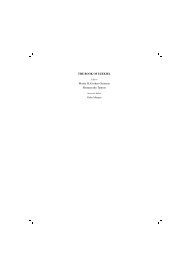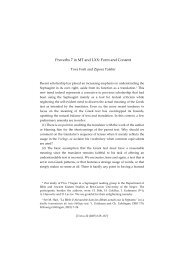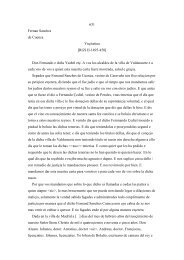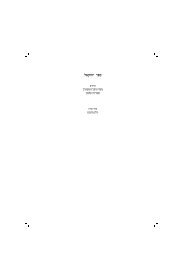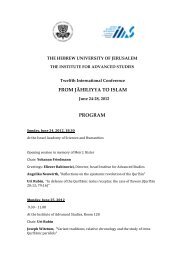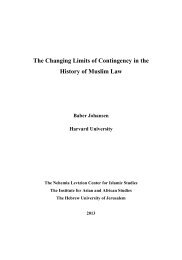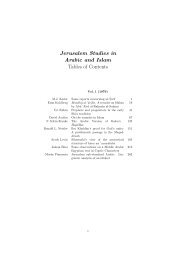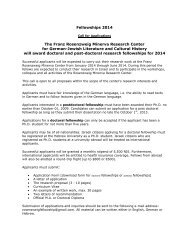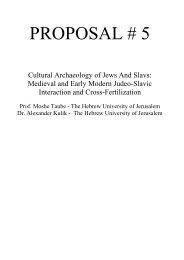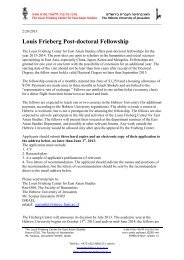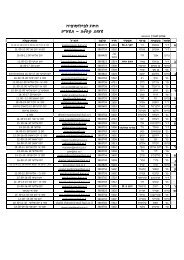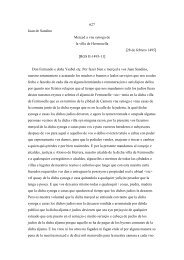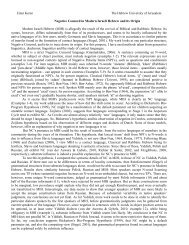Proverbs 7 in MT and LXX: Form and Content
Proverbs 7 in MT and LXX: Form and Content
Proverbs 7 in MT and LXX: Form and Content
You also want an ePaper? Increase the reach of your titles
YUMPU automatically turns print PDFs into web optimized ePapers that Google loves.
136<br />
Tova Forti <strong>and</strong> Zipora Talshir<br />
beyond the stage attested <strong>in</strong> the <strong>MT</strong>, s<strong>in</strong>ce the <strong>LXX</strong> features a series of<br />
additional references to God, unparalleled <strong>in</strong> the <strong>MT</strong>. 12 Noticeably, v. 1a<br />
st<strong>and</strong>s out among these assumed expansions, s<strong>in</strong>ce it emphasizes the Lord’s<br />
uniqueness, an idea that operates on a completely different theological<br />
level. It may, however, be no more than a figure of speech, another way to<br />
express the Lord’s greatness <strong>and</strong> significance <strong>in</strong> human life. It is not difficult<br />
to imag<strong>in</strong>e how this addition came about <strong>in</strong> the context of vv. 1–2 that use<br />
terms such as <strong>and</strong> . In addition, it may have been meant as a<br />
reaction to v. 1: someone felt that the wisdom-teacher overemphasized his<br />
own virtue, <strong>and</strong> made sure that the real authority—the Lord—received a<br />
place of pride. 13<br />
Despite the free spirit of our translator, he can hardly be responsible for<br />
the addition of v. 1a. 14 There is a difference between rewrit<strong>in</strong>g the Vorlage<br />
____________<br />
<strong>in</strong> the composition of the book, or is the result of simultaneous redactional activity<br />
<strong>in</strong> different literary circles. See also Rofé’s meticulous analysis of Prov 31:30 <br />
! ;<br />
A. Rofé, “The Valiant Woman, , <strong>and</strong> the Redaction of the Book of<br />
<strong>Proverbs</strong>,” <strong>in</strong> Festschrift Rudolf Smend (ed. Ch. Bultmann et al.; Gött<strong>in</strong>gen, 2002)<br />
145–155.<br />
12 We cannot go <strong>in</strong>to this <strong>in</strong>terest<strong>in</strong>g question with<strong>in</strong> the boundaries of this article.<br />
Let us just mention some raw statistics: God is mentioned 113 times <strong>in</strong> <strong>LXX</strong>-Prov<br />
(" # 34 times <strong>and</strong> $ 79 times). In <strong>MT</strong>-Prov God is mentioned 92 times ( 87<br />
times <strong>and</strong> 5 times). The <strong>LXX</strong>, then, has 21 additional references to God<br />
compared with the <strong>MT</strong>. These data need analysis before they can be claimed to carry<br />
substantial significance.<br />
13 A similar antithesis is apparent <strong>in</strong> ch. 3: while vv. 1–4 enhance the virtue of the<br />
sage’s wisdom, vv. 5–7 call to trust <strong>in</strong> God rather than <strong>in</strong> one’s own wisdom.<br />
14 Hamonville, Proverbes, 9, refers to the numerous additional stichs—he counted<br />
130—as characteristic of the translator, without consider<strong>in</strong>g the possibility that they<br />
emerged, at least partly, from a different Hebrew text. G. Gerleman, Studies <strong>in</strong> the<br />
Septuag<strong>in</strong>t: <strong>Proverbs</strong> (3 vols.; LUÅ 52; Lund, 1956) 3:36–37, elaborates on the<br />
translator’s tendency to turn an ethical vocabulary <strong>in</strong>to a more religious <strong>and</strong><br />
moraliz<strong>in</strong>g one. Thus, % is translated by % (21:16), <strong>and</strong><br />
& turns <strong>in</strong>to & (1:7). Such cases def<strong>in</strong>itely derive from the<br />
translator.



